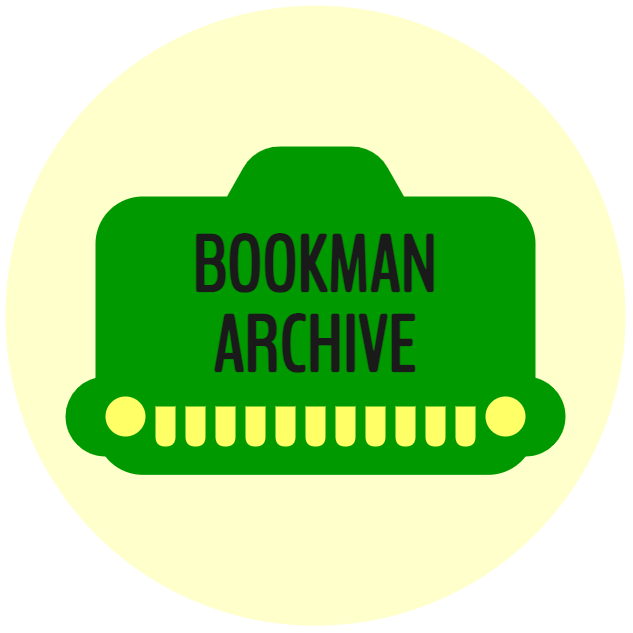
Welcome to the Bookman Archive.
Our aim is to preserve the history of Franklin Bookman, one of the earliest eBook platforms, and understand its place in time and its impact upon the evolution of eBooks.
Follow us as we explore the relationships between hardware, software, business, and human dimensions of the Franklin Bookman ecosystem.
BOOKMAN is to books as GameBoy is to games.
 |
 |
 |
 |
 |
 |
What is BOOKMAN
The Franklin BOOKMAN is an electronic book product line by Franklin Electronic Publishers (FEP). Products were targeted at the mass-market, offering hypermedia access to interactive reference materials in a portable and and convenient format at low cost.
Main genres of Bookman content:
- Dictionaries (mono and multilingual)
- Encyclopedias & History
- Medical
- Religion
- Sports
- Food & Drink
Bookman devices share common functionality:
- Full QWERTY keyboard for navigating indexed content
- Built-in main content ROM that can be expanded with up to two ROM-card slots for additional content
- Ability to send data from one ROM program to another (e.g. a highlighted word from Concise Columbia Encyclopedia to the Advanced Dictionary & Thesaurus in order to get the definition)
- Used common battery technology: AA (LR6), AAA (LR03), CR2032
- 4 colored content function keys
The product line expanded out of Franklin's earlier Digital Book System (DBS) as a way to market additional reference book content (1) and increase per-unit sales volumes (2).
By selling more devices with onboard content as well as the ability to expand via ROM card, each device could appeal to its own genre without additional purchases while simultaneously receive promotional offers for tangential or unrelated content beyond the main focus of the base content.
Player / reader hardware was likely manufactured at a very low profit or like with other consumer-oriented content systems. The DBS, BOOKMAN's direct ancestor, sold only as a reader; users usually had to buy their first ROM cart separately. This made it harder to sell as a whole (public buying behavior is biased towards fewer options and items for the initial purchase) meaning less total sales and profit.
Though no official sales figures have yet been found, this product strategy was considered to be widely successful. The longevity of the BOOKMAN product brand 1995 - 2009 (15 years) is evidence for this success.
The evolution of Bookman products led to a further developed device and content system called the eBookman. It offered a larger touch-sensitive screen, active backlight, and DRM system. A logical conclusion of the Bookman R&D lineage. You can find more information about these units at "eBookman Lives".
"Dick Tracy explains BOOKMAN"
Originally broadcast in 1995
Origins of Electronic Books
The Amazon Kindle is usually what we think of when someone uses the word "ebook" in 2021, which is no mistake as the Kindle ecosystem dominates the eReader market share; 75 - 95% in most countries. It is the most successful eReader ever. But, like many other champion devices, it certainly wasn't the electronics industry's first attempt in this niche. eReaders have a history stretching back almost 40 years prior and the concept and user experience of "ebooks" was developed over much of this time by the company known as Franklin Electronic Publishers (FEP). FEP was undoubtedly the first company to create a purpose-built device for consuming ebooks- indexed and searchable reference works rather than the novel / linear style content as you may think of ebooks now.
Many other online sources will claim that the Rocket eBook (1998) was the first commercial ebook reader. But even a cursory glance at contemporary devices will draw the same conclusion: the claim is solely based on the display technology of the device (ePaper) as there were many platforms offering published digital book content before 1998.
In truth, FEP released the world's first dedicated consumer eBook device (Spelling Ace) in 1986- a ground-breaking product that created a new category of electronic content consumption and gave the company (then known as Franklin Computer Corporation) a lifeline separate from its desktop computer products which were severely impacted following legal troubles due to Franklin's use of reverse engineering in development.
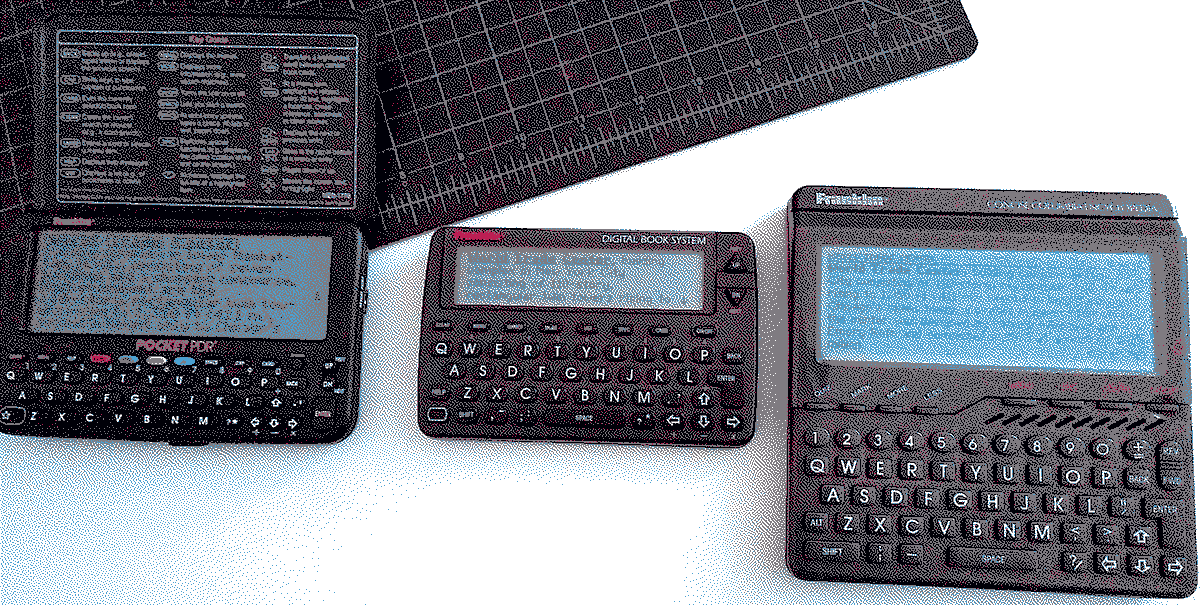
Through this happenstance, FEP realized that the underdog niche of electronic language products was an untapped market. The company banked everything on acquiring suppliers, hiring key personnel, developing, and designing progressively more sophisticated content consumption technologies such as the EC-7000 (a dedicated encyclopedia) and DBS-1 (the direct precursor to the Bookman product line).
With each iteration, FEP would refine their offerings throughout the 1990s and into the late 2000s with various devices and plug-in card systems before being surpassed by more powerful general purpose PDAs, devices with cheaper storage and better display technology, and eventually online-first devices like the modern smartphone.
For a comprehensive history of FEP up to 1998, see this excerpt from International Directory of Company Histories, Vol. 23. St. James Press, 1998..
Archive Aims & Goals
The stated mission of the Bookman Archive is to capture the entire Franklin Bookman hardware and software catalog and preserve the history of this important brand in eBook evolution.
We're working to collect enough examples of hardware and physical media to use as a primary source for material reproductions. We're also looking at contemporary devices in the same market and studying the marketing materials, hardware, software, and supplier dependencies to reveal a great deal about the product strategy and decisions Franklin faced in producing the Bookman platform.
We’re also aiming to create open source software (OSS) that will allow BOOKMAN owners to back up their ROM card contents, and to reverse engineer BOOKMAN I, II, III, and MBS ROM card formats. We're deeply understanding the BOOKMAN hardware in order to create emulators for preserving the BOOKMAN experience independently of the original hardware.
Read on for details on how we're achieving our mission:
1. Preserving eBook history
The archive seeks to capture the entire BOOKMAN hardware and software catalog in order to preserve the history of Franklin Bookman. Currently the archive contains the details of:
- 69 x DBS cartridges
- 3 x DBS devices
- 133 x Bookman cartridges
- 136 x Bookman devices
- 40 x related patents
Physical devices will inevitably wear down; LCD screens + connectors break, capacitors fail, batteries leak and other tangible components of BOOKMAN products will eventually breakdown and become inoperable. As time goes on they become more difficult to replace or repair. Our aim is to collect enough examples of hardware and physical media to use as a primary source for material reproductions in goal #3 (see below).
2. Showing the contextual impact on eBook evolution
We will be looking at contemporary devices in the same market; direct and indirect competitor companies and products. Predecessor and successor technologies will give clues as to how things were and came to be in the midst of the Franklin Bookman brand lifetime. This will be summed into a grand understanding of Franklin Bookman and its impact upon the evolution of eBooks.
Studying the marketing materials as well as hardware + software supplier dependencies will reveal a great deal about the product strategy and decisions Franklin faced in producing the Bookman platform. The archive is gathering an extensive collections of source materials for study:
3. Uncovering the ecosystem that makes the Franklin Bookman
The point is to tie the entire product experience into the modern day by making the experience of using the Bookman ecosystem reliable (for those who still own units) and accessible (for those who do not own units); highlighing the hardware, software, business, and consumer relationships.
Creation of open source software (OSS) that will allow BOOKMAN owners to back up their ROM card contents. The idea is to reverse engineer BOOKMAN I, II, III, and MBS ROM card formats once it is possible to reliably extract the contents.
Deeply understand the BOOKMAN hardware in order to emulators for preserving the BOOKMAN experience independently of the original hardware. Please see the Reverse Engineering Page for more.
TBD: Note research methods and link to project board to see overall status of tasks and contributions towards goals
Help the Archive
We need your help to make our mission a success! You can contribute by sending us hardware (working or broken units), promotional material, supporting software and connectivity devices, and even identify the people who worked at Franklin Electronic Publishers. We also accept donations to help fund our efforts, which you can make on our Buy Me a Coffee page.
Help us capture and preserve the history of Franklin Bookman and its impact on eBook evolution.
A. Help with missing hardware
The archive is trying to source at least one copy of all ROM cards and reader devices. The ROM dumper tool can extract ROMs for hosting on the archive site. We are currently developing tools to extract the onboard ROMs as well!
Devices still missing: TBD
23 of 133 known ROM cards still missing:
- BDE-4043DL
Deutsch / Spanisch Professor - Diccionario alemán-español - BDF-4045DL
Deutsch - Französisch Professor PLUS - BDL-3042
Deutsch / Italienisch Professor Plus Dizionario tedesco-italiano - BKS-6001
Lord Jim - Electronic Novel - BQN-2047
Dutch-English Dictionary - BWC-4
4MB Bookman Writer Card - DBD-3056
Deutsch / English Professor PRO - DBD-4028DL
German / English Dictionary - DEF-2064
Dicionário de Especialidades Farmacêuticas - DEF-2083
Dicionário de Especialidades Farmacêuticas - EDB-2060
The Luther Bible Book / Die Bibel nach der Übersetzung Martin Luthers - GRM-2035
Grammar Ace - HAD-3018
The Medical Letter® Handbook of Adverse Drug Interactions - HAL-3004
The Harriet Lane Handbook - INJ-3017
Handbook on Injectable Drugs - NDH-2062
Nursing97 Drug Handbook - NIM-2072
Gahart’s Intravenous Medications - NLM-2079
Lippincott's Pocket Manual of Nursing Practice - NND-2063
NANDA Nursing Diagnoses: Definitions and Classification - PDI-3032
PDR Drug Interactions and Side Effects (2000) - SDK-2042
Bookman Sidekick 128K - SSA-2085DL
Speaking Spelling Ace - WWC-2052
Weight Watchers® Cookbook
B. Help with missing accompanying printed materials for the leaflet library
- We accept physical copies and have facilities to provide high quality scans
- Alternatively, we also accept scanned images (minimum 300DPI)
C. Help with missing bundled / related software
- CD-ROMs, floppy disks, etc.
- Serial and USB cables
- These were bundled more with the later Franklin units
D. Help with mapping the human aspect of Franklin Electronic Publishers
- The archive staff can reach out to those willing to share their company story and product development journey
E. Help fund the efforts of the Bookman Archve
- Please see our Buy Me a Coffee page. Thank you.
Contact
Reach us via email if you can help.
Supporters
Many thanks to our supporters and contributors who have joined us in this pursuit of preserving this segment of digital history:
- David @ TheGrove
- Michael Dayah
- Jason Ray
- Carlo Ritter
- Paul Bartholomew
- Daniel Nemenyi
System Lineage

System Compatibility
Bookman system compatibility chart coming soon.
Bookman Devices (136)
Bookman Cartridges (133)
Digital Book System Devices (3)
Digital Book System Cartridges (69)
Patents (40)
Reverse Engineering Page
Replacements and Restorations
Bookman Card Blank
This 3D printable card blank will ensure your Bookman cartridge contact strip stays clean and sits flush with the rest of the device by filling the card slot.
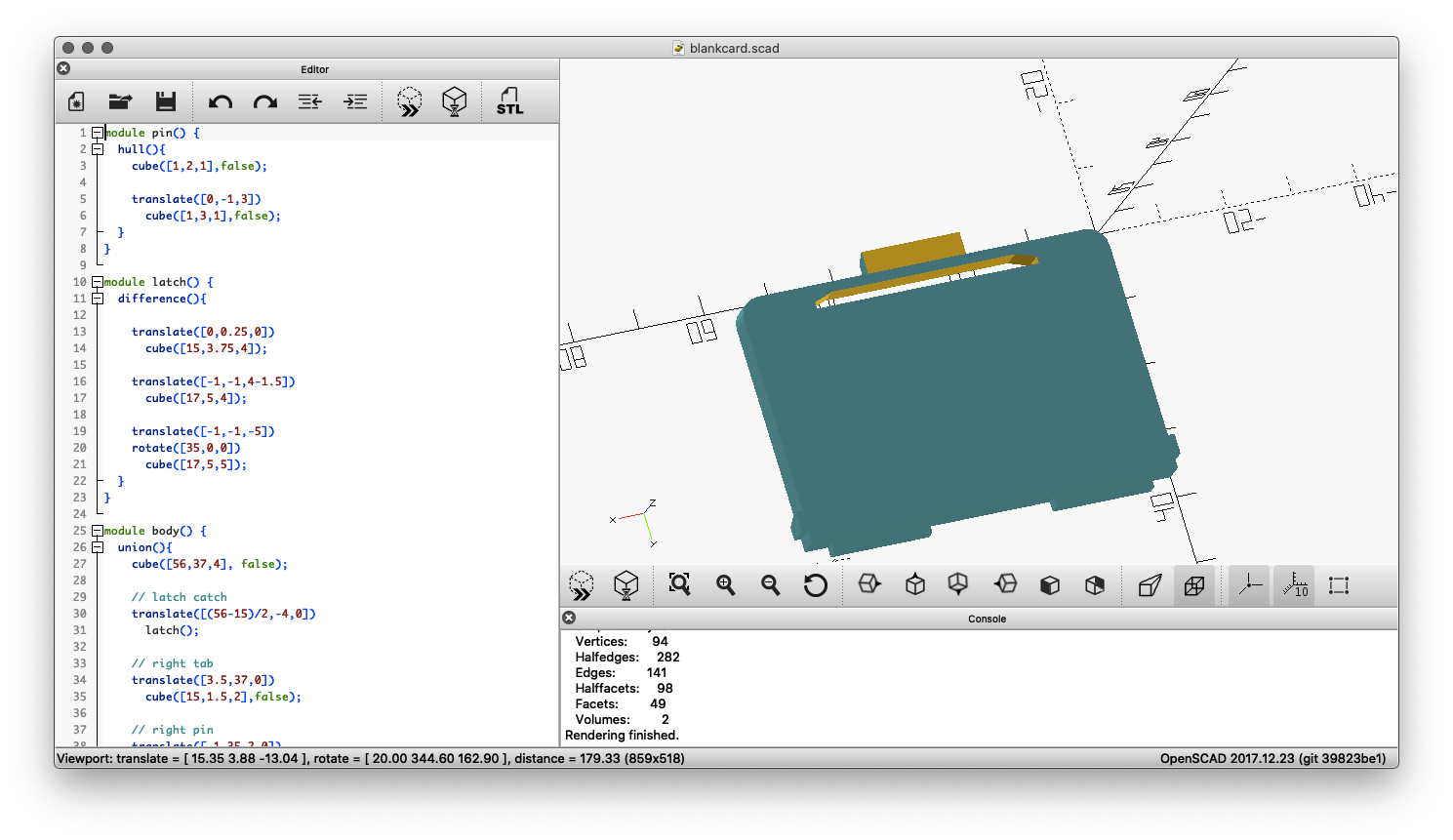
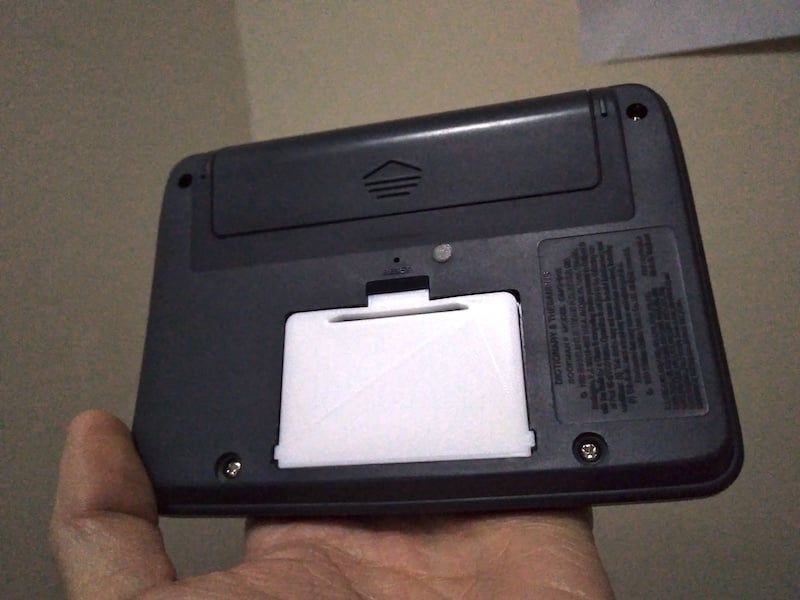

Download blankcard.stlfor 3D printingBookman Label Maker
This tool is used to create replacement labels for Franklin BOOKMAN cartridges that have faded or otherwise deteriorated labelling. The generated labels are downloadable as SVG files and can be printed at 100% scale for a 1:1 reproduction size suitable for application on worn ROM cards.
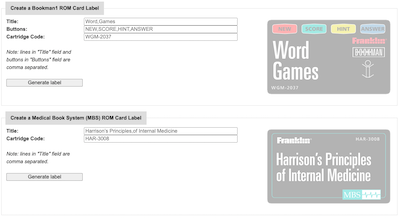
See the source code for this tool here.
Click here to access the Bookman Label Maker
Leaflet Library
You can find scans of various Franklin promotional / catalog leaflets below. Items listed in chronological order.
- 1992 The Franklin Revolution Is About To Unfold (F-1268)
- 1992 Product Registration Card (FCR-26905-00)
- 1993 Franklin Digital Book System (FCR-28900-00-A)
- 1993 Welcome to the Wonders of the Franklin Electronic Library (FEP-28100-00)
- 1994 Welcome to the Wonders of the Franklin Electronic Library (FEP-28100-00-B)
- 1994 Franklin Digital Book System (FCR-28900-00-B)
- 1995 Chips & Bits - Computer Gaming World Issue 127 (CGW127)
- 1995 Your keys to unlocking a world of instant medical information... (361900)
- 1995 The Franklin Electronic Library (FEP-28106-00-A)
- 1995 Franklin Electronic Book System Cartridge Catalog (FEP-28107-00-A)
- 1995 Franklin Electronic Book System Cartridge Catalog Vol. 2 (FEP-28107-00-B)
- 1996 The Franklin Electronic Library (FEP-28106-00-B)
- 1996 Franklin Digital Book System - New! Updated Catalog (FCR-28900-00-C)
- 1996 Get 25% Off ALL BOOK CARDS (FEP-28918-00-F)
- 1997 The Franklin Electronic Library (FEP-28106-00-C)
- 1997 The Franklin Electronic Library (FEP-28106-00-D)
- 1997 Get 25% Off ALL BOOK CARDS (FEP-28917-00-G)
- 1998 Introducing Franklin's MBS Medical Book System (FEP-28117-00-A)
- 1998 The 1998 Pocket PDR and PDR DataCard (FEP-28120-00-A)
- 1998 Look Up Information Instantly -- Electronically (Radio Shack 1998 Catalog)
- 1999 Franklin: A World of Knowledge in Your Hand... (FEP-28123-00-A)
- 2000 Franklin: A World of Knowledge in Your Hand (FEP-28123-00-B)
- 2002 Franklin: Worldwide Leader in eBook Technology (FEP-28126-00-C)
- 2002 Get More From Your Franklin Product! (MPB-28901-00-A)
- 2002 £5 OFF Any ROM card shown below from FRANKLIN (UK-RV001)
- 2003 Franklin: Solutions in Portable Knowledge (Spring 2003)
- 2004 FRANKLIN (FEP-28129-00A)
- 2005 Machen Sie mehr aus Ihrem Franklin BOOKMAN! (MPB-28905-00-B)
- 2006 FRANKLIN Grenzenloses Sprachenwissen rund um die Welt (FEP-28129-00A)
- 2007 Marketing That Works: How Entrepreneurial Marketing Can Add Sustainable Value to Any Sized Company
- Source: https://books.google.co.uk/books?id=JdoACgAAQBAJ&pg=PT155&lpg=PT155
- ISBN: 978-0137021338
Supporting Software
This is a collection of disk images and files of related software that came bundled as part of various Franklin DBS / Bookman devices. Click to download these files.
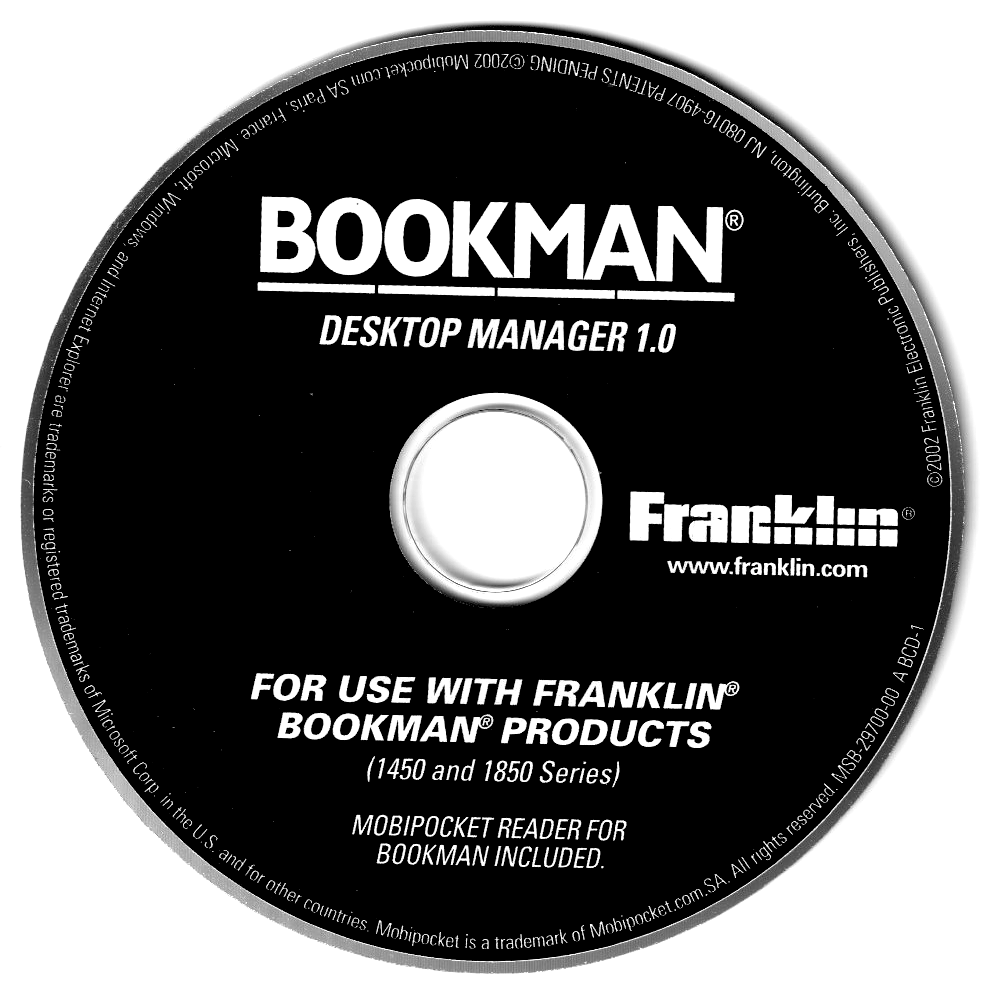
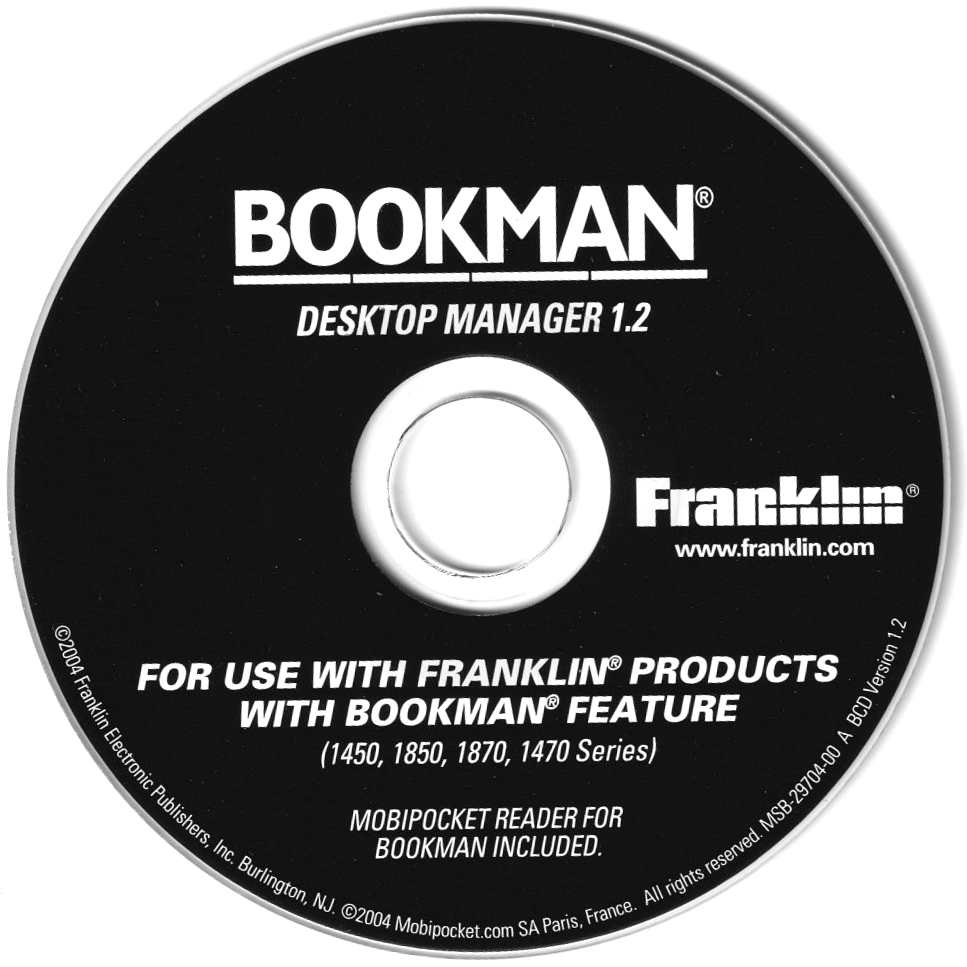
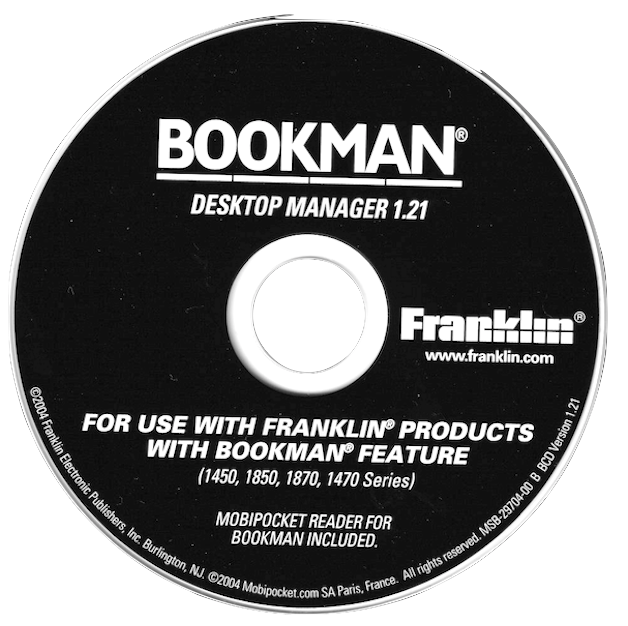
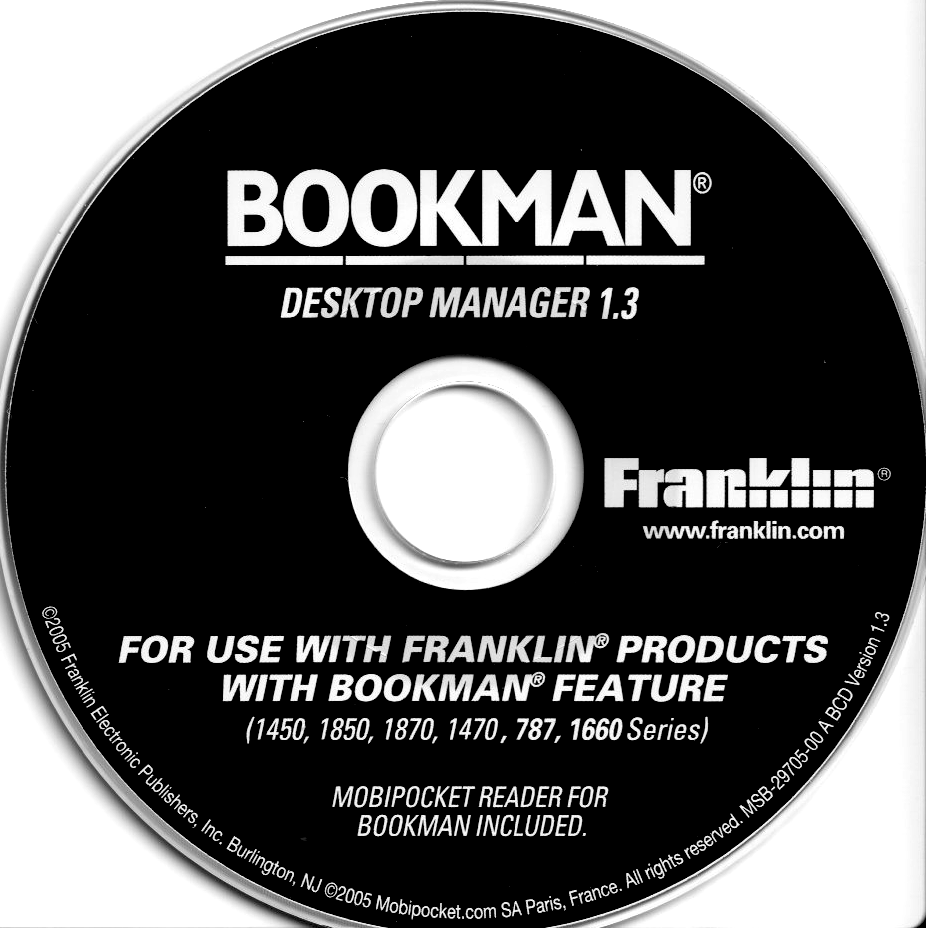
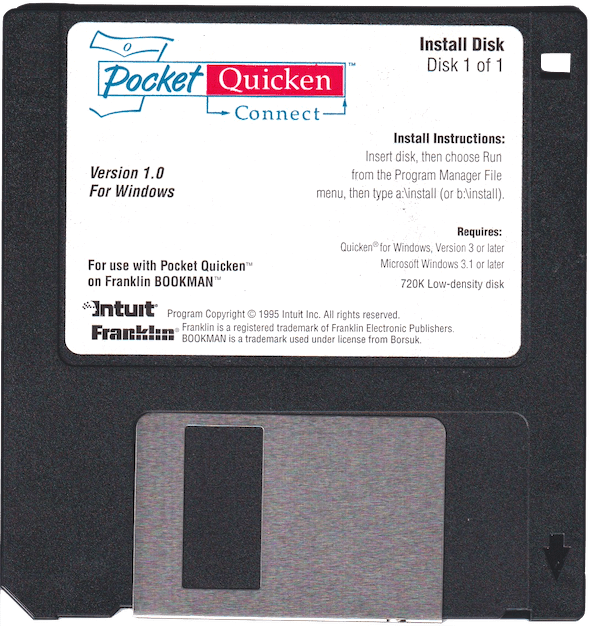
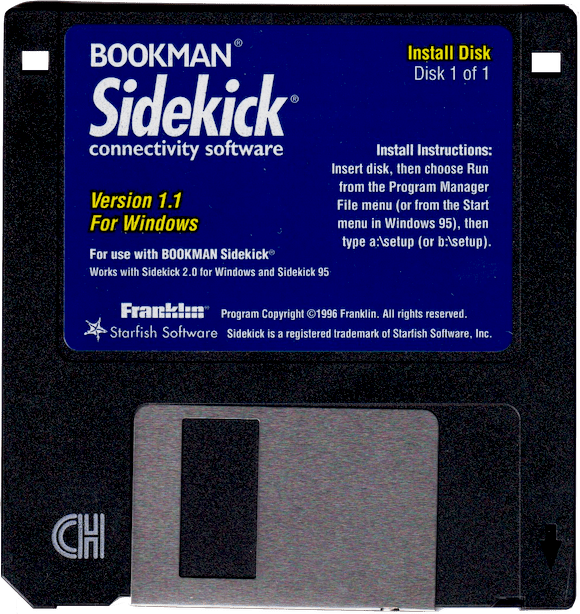
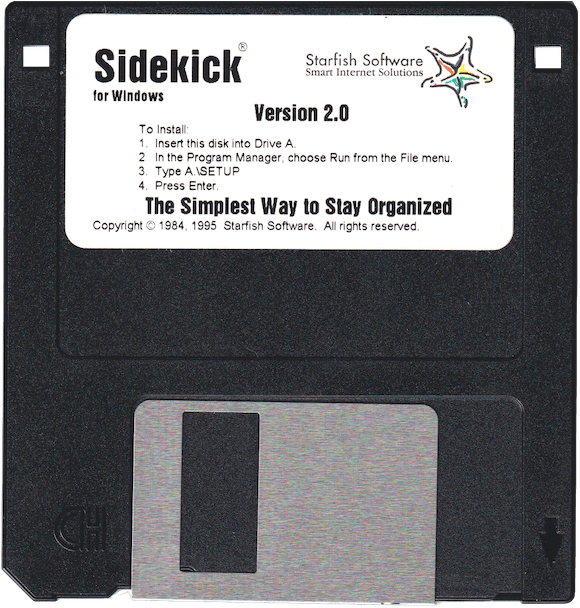
FEP Press Releases
- 1990-08-23 Franklin Electronic Publishers has Signed Seiko to Market Its Hand-Held Electronic Dictionaries
- 1992-07-28 Franklin Aims to Release Publications on ROM Card
- 1993-10-07 Franklin land Allen-Bradley Deal
- 1994-01-06 Franklin Electronic Make a Comeback
- 1994-05-27 Merck Manual Available For Franklin Digital Book System
- 1995-01-10 Franklin's BOOKMAN Expands with Plug-In Books
- 1995-10-16 BOOKMAN for Pocket Quicken Banks on Convenience
- 1996-06-03 Franklin And Starfish Announce World's First Portable Sidekick® Personal Organizer On Bookman® Platform
- 1996-06-09 Pocket Size: Bookman Is Best Reference Book
- 1996-10-28 Appointment With Your Pocket Organizer Destiny
- 1997-01-01 Gahart Intravenous Medications to be released
- 1997-04-13 Up Close and Personal With Hand-Held PCs (NYT Technology > Cybertimes)
- 1997-05-15 Electronic books for the Far East
- 1997-08-18 Taking a Page from BOOKMAN
- 1997-08-28 Franklin Unveils Proprietary RISC Processor
- 1999-09-29 Xircom Purchases Rex® Product Line from Franklin Electronic Publishers
- 2000-06-27 Franklin.com to Become Authorized Microsoft Bookstore
- 2000-09-26 Franklin Electronic Signs Marketing Agreement
- 2000-11-01 Ten O'Clock Tech: Franklin Launches E-Book Reader
- 2001-02-01 Franklin Releases Content Developers' Kit for eBookMan Platform
- 2002-11-25 Franklin licenses chip technology to Ademco
- 2003-04-14 Future products move to using ARM9 processors
- 2003-06-25 Franklin Electronic licenses reference work rights
- 2006-07-27 Kreutzfeldt Electronic Publishing and Franklin Electronic Publishers Join Forces
- 2008-04-09 Franklin Electronic Publishers, Inc. and Teachers of English Speakers of Other Languages, Inc. (TESOL) to Sponsor Worldwide English as a Foreign/Additional Language Spelling Tournament
- 2010-02-26 Franklin Electronic Publishers goes private
- 2018-02-06 Lexibook and Franklin join forces in the UK and French markets
FEP Company Miscellany
Critical Web Snapshots
USB Vendor Code
FEP received its own official number in the USB vendor code list after submitting it to the USB consortium:
0x09b2(hex) or2482(dec). The submission was related to use of USB for the eBookman device.Manufacturer Code / FCC Code
- FCC ID was
CK2 - Manufacturer Alpha Code was
FRK- Manufacturer Alpha Codes (MAC) in compliance with the Office Products Industry Data Standards (OPIDS) Initiative
- Roughly speaking, a voluntary standardization of SKU for office products
SEC Filings
Common Stock Certificate
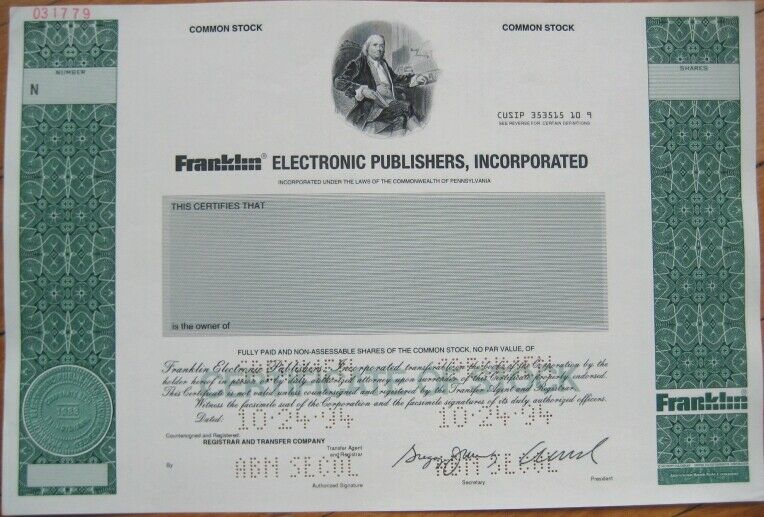
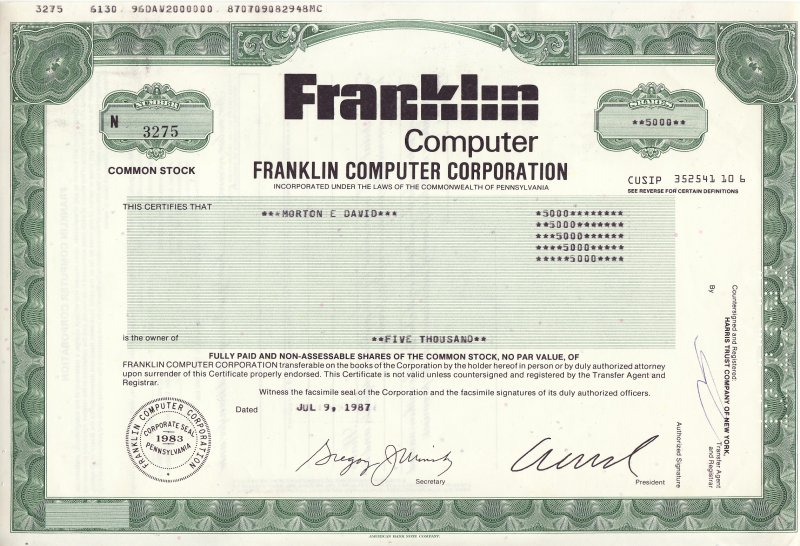
Changelog
2025-02-26
- New leaflet scan
2025-01-20
- Added new leaflets
- Added high-resolution scans of DBS cartridge packaging
- Added scans of Quick Reference cards for DBS cartridges
2025-01-08
- Update missing cartridges list
2024-12-30
- Complete refresh of cartridge imagery after high-resolution snapshots
- Added new images for STK-2032
2024-03-21
- Fix links for disk images in Supporting software
- New images for
2023-10-02
2023-09-15
- Moved site onto Cloudflare, away from GHPages
2023-01-13
2023-01-06
- Added further development team credits screen to the Reverse engineering page
- Added better images for these cartridges
2023-01-05
- Added Factory Test Mode finding to the Reverse engineering page
2022-12-20
- Rewrote sections of the reverse engineering page, larger re-organization / updates coming soon
2022-10-05
- Added a new leaflet:
- Added box scans for several devices and cartridges
2022-09-23
- Separation of BMC-2 / BMC-4 from BWC-2 / BWC-4 cards
- The BWC cards were precursors to the BMC cards of the Bookman3 systems without the need for a dedicated writer accessory
- Added images for
- OAS-1850 Franklin Speaking Dictionary containing the Oxford Student's Dictionary (Arabic / French / English)
- LCE-560 Larousse 2000 Copiloto (packaging)
- BW-10 Bookman Writer
- BWC-2 Bookman Writer Card 2MB
- TFR-440 Le Robert Dictionnaire des Synonymes (rear, packaging)
- TRA-400 Deutsch / Englisch Wörterbuch (packaging)
- MWX-1450 Deluxe Portable Reference Suite (packaging)
- BDF-3045 Deluxe Portable Reference Suite (packaging)
- B-1100 Speaking Chinese-English Bilingual Dictionary (packaging)
- MTC-640 Mémoires du XXᵉ Siècle (packaging)
- Added manual for
- Added new leaflet
2022-09-16
- Added new images for
2022-09-15
2022-09-01
- Added photos of cartridges and update physical archive holdings
- BFE-2080
- QBD-2067
- MTC-640
2022-08-11
2022-07-23
- Added many detailed photos of the rare B-1100 Speaking Chinese-English Dictionary Bookman unit
- Updated archive cartridges list
2022-07-14
- Added several cartridge images to the catalog
- Marked new additions to the collection
2022-06-06
- Added new leaflet: Get 25% Off ALL BOOK CARDS (FEP-28917-00-G)
- Added many different cartridge images
- Added new device images
2022-05-06
- Large update to tabular data for:
- Vast re-organization and standardization of tabular data
- Notable images also added to patent information
- Many quality of life improvements; URL query links work to automatically open in-depth view for every page displaying tabular data
2022-04-30
- Added new promotional leaflet: Franklin Electronic Book System Cartridge Catalog Vol. 2 (FEP-28107-00-B)
- Added a new manual PDF for Parker's Wine Guide (WNG-440)
2022-04-04
- Added new promotional leaflet: The 1998 Pocket PDR and PDR DataCard (FEP-28120-00-A)
- Added many new images for packaging and book cards: front and back shots
2022-03-28
- Simplified design of the site slightly, changed some copy in share previews and general copy tidying
- Added table of contents functionality
- Removed IFrames for tabular listing info
- Edited copy for a few sections
- General clean up and organization continues
2022-03-16
- Add new logo and favicon
2022-03-06
- Added
The Franklin Electronic Library (FEP-28106-00-B)catalog into the Leaflet Library
2022-03-05
- Site has moved to its own domain:
bookmanarchive.com!
2022-03-04
- Added the Bookman Label Maker online link in the Replacements and Restorations section
2022-02-21
- Added Bookman Desktop Manager CD key generator details into Reverse engineering page
2022-02-20
- Added
Franklin: Solutions in Portable Knowledge (Spring 2003)catalog into the Leaflet Library
2022-02-16
- Added
Franklin: Worldwide Leader in eBook Technology (FEP-28126-00-C)into the Leaflet Library - Added ISO for BCD-1 (Bookman Desktop Manager 1.0)
2022-02-13
- Added several more devices and cartridge notes
2022-01-26
- Added BCD-4 1.2 ISO image
- Added EDB-640 (German Language Martin Luther Bible) entry into systems
2022-01-23
- Added
Franklin: A World of Knowledge in Your Hand (FEP-28123-00-B)into the Leaflet Library
2022-01-17
- Added ISO for BCD-4 (Bookman Desktop Manager 1.3)
- Added
Franklin: A World of Knowledge in Your Hand... (FEP-28123-00-A)into the Leaflet Library
2022-01-13
- Added several monolingual European language 440 units
2022-01-11
- Added English manual for BCD-2USB
- Added additional sample PIDs (DRM related) for the Bookman Desktop Managers
2021-12-01
- Added loads more manuals
- Added many different European BOOKMAN devices
2021-11-27
- Added HAT-3016, DOC-3026 MBS cartridge details
- Added competitor systems info
- Planning examination of contemporaries / competitor systems
- PROS / CONS
- Pricing
- Longevity
2021-11-05
- Reordering sections of the site homepage
- Break out Help the Archive into its own section
- Add several new cartridge images
- todo: create teardown instructions for the device ranges
2021-10-27
- Added basic patent section with a listing of all company owned / licensed patents related to Bookman devices
- Fixed close on click issue for tabular item display overlays (there is a large X in the top right corner that can be used to close these now!)
2021-10-26
- Added some new cartridge photos and a new cartridge: BLB-2069 (Total Baseball Encyclopedia 1997)
- Preparing patent portfolio section data
- Gathering patents and supporting materials
2021-10-19
- Added clearer photos of several new cartridges to collection
- Removed duplicates from image collection
- Gathering plans for additional research into the Bookman system technology
- Patents
- Personnel
- Prior art / contemporaries
2021-10-06
- Added additional cartridge images
- Added help + donation options in the Archive Goals section
2021-10-03
- Added company PR newspaper article from 1996-06-09
- Added todo list, additional images, and notes for Reverse engineering page
2021-09-28
- Supporting software section added
- Added several more leaflets to the Leaflet Library
- Added ROM dump files to Dumped Bookman ROMs
- Added files for inspection (binary viewer)
2021-09-26
- ROM dumps added to Reverse engineering page
2021-09-14
- Added additional ROM dumper attempt notes to Reverse engineering page
- Significant progress made for ROM dumps
- Added more device teardown photos
- Added link to 65C02 disassembler as note to follow up on later
2021-09-02
- Added dumped ROM for the Brother PN8800FXB device to Reverse engineering page
- Initial analysis done on the ROM
2021-08-24
- Added SPB-440 Bookman 1 device
- Moved device teardowns to Reverse engineering page
2021-08-21
- New promo leaflet PDFs available
- "Pocket PDR product line - 1996"
- "The Franklin Revolution Is About To Unfold - 1992"
- "Digital Book System - New Updated Catalog - 1996"
- DBS-1 manual available as a PDF
2021-08-20
- Updated ROM card pinout on Reverse engineering page
- Nearly all pins identified
2021-08-05
- Added ETY-640 "Empty Bookman" unit, bizarre device!
- Added Spanish language Bookman devices and cartridges
- BDE-3031
- LCE-560
- GDE-2078
- GDE-2082
2021-07-31
2021-07-28
- Reverse engineering milestone: onboard PROM chip for MWD-1450 mapped to Bookman 42-pin card interface. This allows us to figure out how to read onboard / user-added ROMs!
2021-07-25
- Added DBS-2D photos in the DBS devices section
2021-07-19
- Add scanned PDFs of all leaflet library items
- Add scanned PDF of DBS-2 manual
- Add 3D models of DBS-2 and DBS-2D retail boxes
2021-07-18
- Add higher quality + higher resolution scans of items within the Leaflet Library
2021-07-14
- Add teardown photo for ROM card: WGM-2037
- Mapped ROM bank pins to ROM card pins, signal analysis of these pins is next
2021-07-11
- Add device teardown photo for MWD-1440 Bookman 2 unit
2021-07-05
- Additional Babylon Plus (Texton) devices added
2021-07-04
- Added MB-204 Texton Babylon Plus to devices
2021-07-02
- Added 2004 Pocket PDR MBS Cartridge + Manual
2021-06-29
- Added DBS-2D Desktop Digital Book System stub (images will follow shortly)
2021-06-27
- Modified ROM slot blank 3D printable model to tweak for ease of use
- Added several more ROM cards to listing
- Added several Bookman reader units to listing
2021-05-18
- Expanded serial data flows graphic in the Reverse Engineering Page
- More aspects of the BMC-2 vs Bookman Desktop Manager messages reversed
- Added direct link functionality to items on the device and cartridge pages, use the link like this:
https://bookmanarchive.com//carts.html?VPD2048
2021-05-02
- Renamed "Bookman Technical Details" to "Reverse Engineering Page" and moved it to its own page
- Added several more photos of teardowns
- Added some hardware notes for reverse engineering effort
2021-04-28
- Added DBS cartridges section
- Added System Compatibility sections to each of the types of ROM card device sections
- Added Device Teardowns section
2021-04-25
- Added lightbox widget for viewing leaflet library
- Added the "Leaflet Library" section
2021-04-22
- Readers can now invert the page colors for a basic night mode
- Added DBS demo cartridge video
- Add anchor link opening of sections and content
2021-04-19
- Included an updated ROM cart pinout diagram
- Reword archive goals and add easier to read diagram for steps involved
- TODO: Add Wanted HW / SW / PRINT + MEDIA section to elaborate on missing links as they relate to goals
- Add several new systems and photos for them
2021-04-13
- Added many more manuals and photos of ROM carts
- Revised large chunks of "What is BOOKMAN" and "Origins of Electronic Books"
- Some notes written for data coming from the serial port on PQN-560
2021-04-11
- Coded a much better devices / cartridges content preview window, click on a table row to access the details
- Expose user manuals through this preview
- Added ROM card pinout diagrams
2021-04-01
- Website published
Did you find this topic interesting? Check out other projects like this one!
- BDE-4043DL